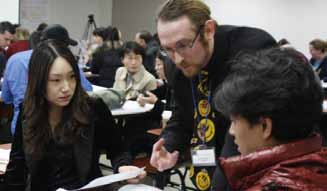 | ▲Peadar Callaghan leads a workshop at a previous Seoul KOTESOL
event. (KOTESOL) |
|
Korea Teachers of English to Speakers of Other Languages will hold its annual international conference on Saturday, Oct. 12, and Sunday, Oct. 13.
KOTESOL expects 1,400 teachers to join the conference at Sookmyung Women’s University in Seoul to discuss issues in English education, and hear from some of the field’s top figures. There will be 140 presenters from Korea and elsewhere giving 225 presentations and workshops, as well as 40 educational displays and 60 promotional sessions.
The conference’s plenary speakers will be Dick Allwright, former chair of applied linguistics at Lancaster University; Thomas S. C. Farrell, Brock University professor of applied linguistics; and Graham Crookes, professor of second language studies at the University of Hawaii. There will be an additional 11 featured speakers at the conference. The theme of KOTESOL’s 2013 International Conference is “Exploring the Road Less Traveled: From Practice to Theory.”
According to conference chair Carl Dusthimer, teacher-training programs generally emphasize the importance of basing classroom instruction on teaching theory, but the relationship between teaching and practice goes both ways, creating a positive cycle between research and practice.
He said this conference aimed to highlight the importance of practice informing theory. KOTESOL publicity officer Robert Dickey explained that teaching shared a problem with many professional areas, in that people sometimes did not pay enough respect to those in less senior positions. “You get your people who have their seats at university, and then you have got people who are teaching twice as many hours a week for less respect, less pay,” he said. “We are basically saying these people are professionals. They are working hard, they know what they are doing, they’ve been educated, to greater or lesser levels, and the people who are sitting in the research centers need to listen to those teachers and learn from them.” Other sessions will cover everyday practice in the classroom and new teaching ideas. “Our participant surveys highlight the fact that conference attendees are most pleased with those conference elements that lead to better teaching the very next week of school,” said Dusthimer. The conference will also have a book exhibition, with 30 publishers and distributors expected to show their educational materials and run special workshops. KOTESOL said its membership has grown recently, with 932 members.
“We have more members than ever, representing diverse English teaching settings across Korea, including hagwon (private language school) teachers, public school teachers, kindergarten teachers and university faculty,” said KOTESOL president Lee Mi-jae.
Dickey said about onethird of the members were Korean, and the bicultural aspect had important benefits. “It’s easy to say that the Koreans are learning from the expats and the expats are learning from the Koreans, because one is better at English and the other is better at Korean culture, but it goes much deeper than that,” he said. Dickey explained that many of their Korean members had master’s degrees in TESOL from the U.S. and knew more about some aspects of English than their newer expat counterparts, while some expat members used Korean in class. He said this made for a continuous spectrum of expertise.
“It looks on the surface like the organization would be split, but if you look at skills and expertise it is pretty seamless,” he said.
This year the organizers plan to incorporate more social and networking opportunities, for example, by replacing the more formal dinner with a standing buffet that will be able to accommodate more people and allow people to move around more freely. “In the past we’ve had sit-down banquets; with an awards ceremony 100 people who were pre-registered, most of whom were invited,” said Dickey. “But we are going to do something that is going to be a bit more casual, hopefully alfresco if the weather permits.” Onsite admission to the conference costs 50,000 won for KOTESOL members, 75,000 won for nonmembers and 30,000 won for undergraduates. Registration can also be done online, with discounts for those who do so by Oct. 1, at www.kotesol.org, where more information is also available. Those who join on the day qualify for the membership discount. | 

